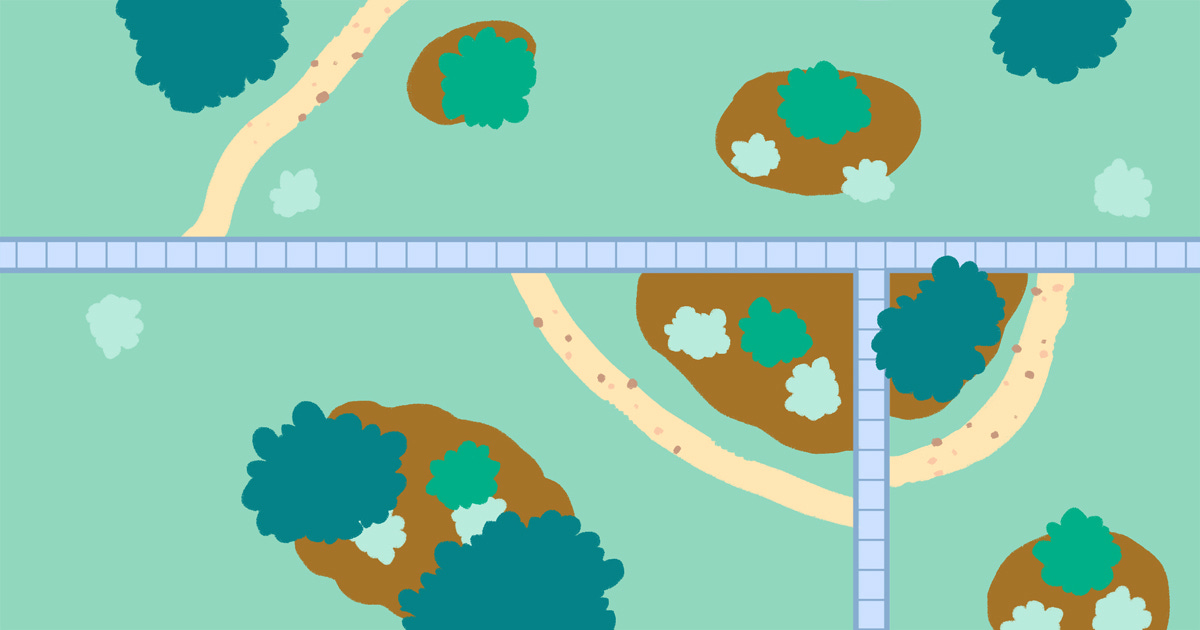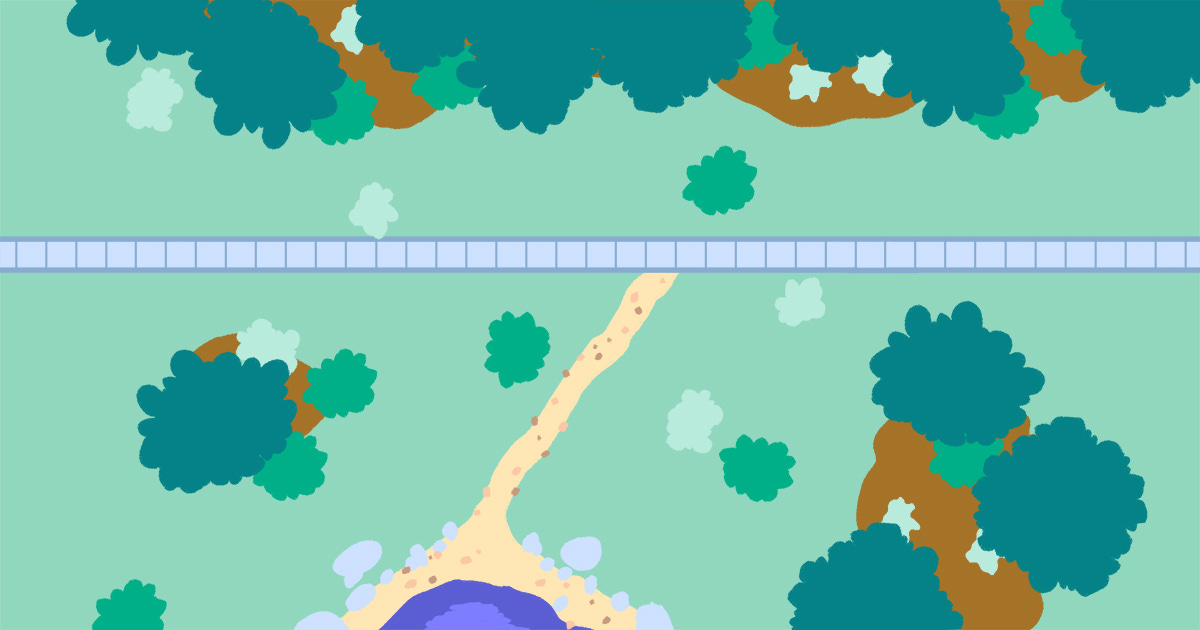🌾 Making a New Path Through Social Media
Intentionally stepping out of the flow to become digital flâneurs.
Recently, we had been feeling dull and unfocused within the four corners of our home office/living room/gym. We didn’t know there was a word for it until the New York Times published an article and nailed our feelings of languishing — a psychological term used to describe a sense of stagnation and emptiness — toward living and working through the in-between awkwardness of pandemic year two.
Early on in the pandemic, we depended on social media to stay connected with family and friends, align with co-workers, and live vicariously through others but now that we've been relying on it for so long, it is wearing on us. Our smartphones seem to be appendages for our own eyes and ears out in the world. The more we interact within the Internet, the more it asks of us.
For instance, Rob Horning writes in Real Life magazine about how YouTube’s recommendation algorithms produce compulsive viewing. Horning writes, “Engage with this thing so you can stop worrying about what to engage with.” They call this propensity for binge watching “flow” in the broadcasting industry and anthropologist Nick Seaver details it as “persuasive technology” in his paper, “Captivating algorithms: Recommender systems as traps.” Flow is where coercion and persuasion can’t be distinguished. In this in-between moment, we are pushing back, looking to define some boundaries for our own time and attention.
Horning writes, “We are neither forced to consume more nor choosing to consume more; we both want the particular units of content and are indifferent to them. We are both active agents and passive objects.”
Even before pandemic times, artist and writer Jenny Odell was questioning how apps were created to keep us productive, to keep us efficient, to save ourselves some time in her widely praised book How to Do Nothing. She called out the business model of platforms that rely on advertising and engagement data to create an “arms race of urgency” which “abuses our attention and leaves us no time to think.”

The writer Kaitin Tiffany for Vox Media wrote, “What if social media were a public utility — one you used for your own purposes and left alone otherwise?” We want to park here for a moment to think, ‘what if?’
We wonder what it would feel like to make our own rules of engagement on social media and become digital flâneurs — passionate wanderers who stroll a city or place to fully experience it. We yearn to become modern day Walt Whitmans in wonderment over a digital leaf of grass. What could that grass be a symbol for? Freedom?
We aren’t advocating for completely unplugging and disconnecting, but what could our social media practice look like if we could design the domains we enter to be less time consuming, manipulating, or commerce ridden? What if they become flourishing spaces, spaces of joy, spaces of humor?
We want to embrace the small gestures we can make to get us closer to flourishing. We’ve learned that flourishing is the opposite of languishing and we want more of it in our lives. We want to sit in real life public spaces, like parks and plazas to watch people and be in nature as North America enters Summer. We want to invest in community and connection through supporting small online communities like MaximumFun, an artist-owned and audience-supported podcast network, or Front Porch Forum of Vermont, an app that helps neighbors connect in a thoughtful way.
In the spirit of this recommitment, we are announcing to you, that we’re trying an experiment this coming week. Until further notice, Tuesdays will be Twitter Tuesdays for @WeAreNew_Public. We’ll have something to say, and start conversations relevant to our mission of reimagining digital public space.
But we’ll only be doing it on Tuesday. You can mention us in a tweet on Wednesday, but don’t be surprised if we don’t respond until the following Tuesday. Wednesday, Thursday, Friday, Saturday, Sunday, and Monday will be, well, non-Twitter days.
We understand that this is not the way Twitter was designed. The algorithm rewards constant engagement and interaction. Twitter aspires to be a public square, like a park; one of the best things about parks — and all the physical public spaces we think about — is that there are many, many ways to use them besides what the planners intended.
The informal paths made by people walking off an intentional, established walkway are called desire lines, created as a consequence of human foot traffic as a shortcut between an origin and a destination. We see them in our parks and know that some smart person trudged a road previously unthought of. Over time, conservationists have learned to “ground-truth” in improvised trails through forest, so they can formalize and incorporate the best ones, while discouraging the unproductive ones. In that same spirit, we are inspired to make some new unintended paths.
Are you motivated to rethink how you are scheduling your day or week? Do you have new paths to speak of? Leave us a comment on Twitter or below.
Upcoming Community Event:
Reimagine the Internet through alternative models for community with the Wikimedia Foundation’s Katherine Maher and the Institute’s Visiting Research Scholar Ethan Zuckerman. Monday, May 10th. (Knight First Amendment Institute at Columbia University)
Essay Links for Your Own Meandering:
The dominant emotion of 2021 is that blah feeling we pinned as languishing. (New York Times)
Post-vaccination inertia is real. Readjusting our ideas about what’s safe is going to take time. (The Atlantic)
Uhtceare is an Old English word that refers to anxiety experienced just before dawn. (The Paris Review)
Susan Clarke’s fantasy world of interiors. (The New Yorker)
The other side of languishing is flourishing. There is a positive to the negative to aim for! (New York Times)
How to quit Facebook without quitting Facebook. (Vox)
Informal paths known as desire lines can be found all over the city and all over the world. (The New Yorker)
Op-eds from the future: business school students predict tomorrow’s headlines and they are convincingly non-fiction. (IDEO)
The New_ Public team
Illustrations byJosh Kramer
Civic Signals is a partnership between the Center for Media Engagement at the University of Texas, Austin, and the National Conference on Citizenship, and was incubated by New America.



Personally, I find it's most useful to start by mapping out your *offline* priorities on daily, weekly, and monthly time-scales, and then to decide which online personal/social routines can be *optionally incorporated* into that schedule, and which seem truly necessary. This all comes down to different sets of values, priorities, and circumstances, but the fundamental question is "do I really need/want to spend x amount of time on Platform X today/this week/this month? Or would I rather spend that time doing Activity Y?"
On the topic of time, there really is only so much you can do even in a single day, and taking the time to reflect upon what you have the time/capacity for vs what you are currently doing vs what you would like to be doing is incredibly grounding. I periodically revisit and reconsider my own 'ideal day', but for the most part have settled on a basic framework for what a wholesome/healthy day would look like for me (and my partner).
In other words, we actually shouldn't first ask ourselves "how much time do I want to spend on Social Media today/this week/this month?", but rather "how would I like to spend my time in general, given my circumstances?", and only then focus on the Social Media option.
You may be interested in this conversation from last year where I described my divergence from standard Social Media regimes and how I went on to reconfigure my relationship with the online sphere: https://write.as/community/chat-with-sean
There are countless alternative paths to take beyond those which inevitably lead back to the toxic, exploitative environments of Facebook/Twitter/Instagram, etc. and having wandered these paths for several years now, can say that I feel far healthier & more fulfilled having done so.
Anyway, just my two cents. I appreciate the work that you're all doing and wish you the very best in your mission - these topics are all-too-important and overdue for broader discussion. I missed the New Public Festival, but look forward to watching the recordings later.